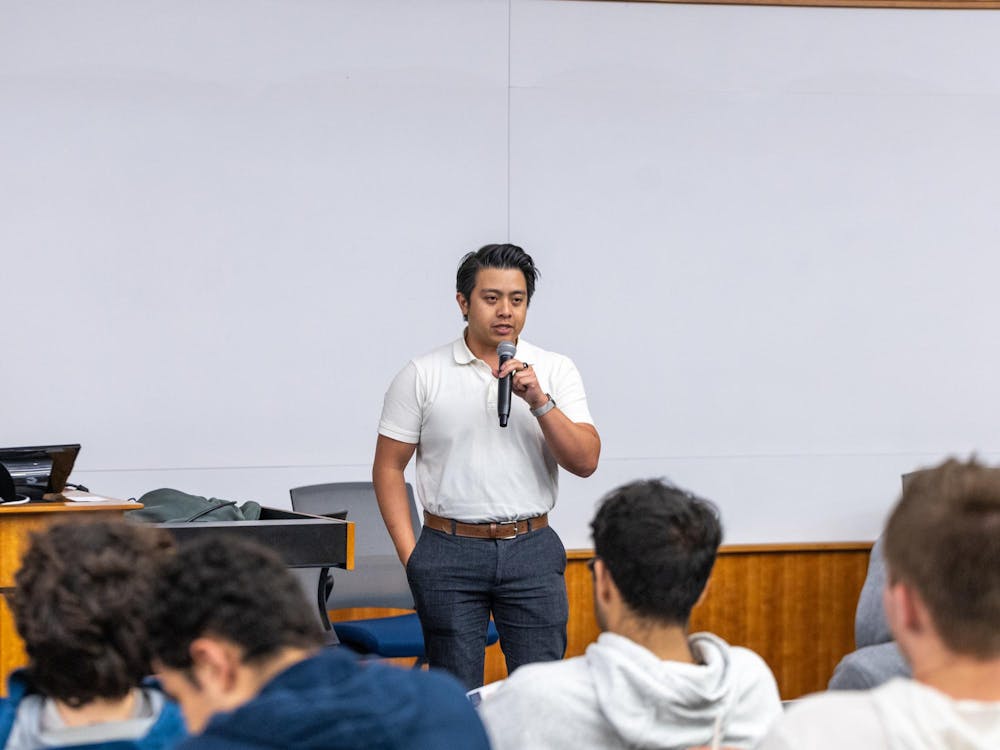Duke Graduate and Professional Student Government heard a presentation from University administrators addressing Duke's economic impact on Durham and reflected on the “State of GSPG” during its first meeting of the semester Tuesday.
Administration addresses Duke's economic impact on Durham
Adam Klein, associate vice president of economic development, and Elinor Landess, assistant dean of students and director of off-campus and community life, spoke about how Duke plans to continue to collaborate with and uplift Durham.
The Duke Respect Durham movement has urged the University and its health system, which are both tax-exempt 501(c)(3) organizations, to make PILOTs — payments in lieu of taxes — to Durham. According to the movement’s proponents, these payments would compensate for revenue lost from Duke’s tax-exempt status, amounting up to $50 million per year.
Several of Duke’s peer institutions with similar endowment sizes, including Johns Hopkins University, Cornell University and Dartmouth University, have committed to making PILOTs to their respective communities.
Klein referred to Duke’s economic impact on the city, noting that it contributes $7.2 million in property taxes through leases and makes direct payments to the city for EMS and fire service. He added that in 2024, Duke spent $232 million on Durham-based vendors and provided 23% of the jobs in Durham and $10 million to Durham-based nonprofits.
According to Duke Respect Durham, although Duke makes payments to Durham, “they do it on their own terms.” With the estimated $50 million, the movement’s organizers claim that the city could make strides towards providing more affordable housing and increasing teacher pay and public school funding.
“The $50 million number is twice as high as the largest PILOT ever at Yale,” Klein said, noting that $10.6 million would be a more accurate estimation of Duke's tax burden, were it not a nonprofit.
Klein also contested the movement’s claim that Duke owns 11% of the land in Durham, instead stating that it owns 3%. He said that Duke obtained this figure through the Durham County tax assessor.
Beyond the payments it already makes to the city, Duke invests in the community by launching initiatives focused on career readiness and workforce development partnerships at public high schools, as well as purchasing from Durham small businesses and supporting the development of affordable housing.
However, Klein acknowledged that many residents and students are unaware of Duke's contributions, admitting that “Duke hasn't done a good job of sharing” such information.
“In the absence of information, people assume the worst,” he said, adding that Duke plans to launch the Duke Center for Community Engagement in February, allowing Duke to “[think] about the ways that [it] can do a better job of creating kind of a front porch for the community.”
“I do think that many of the things that Duke wants and many of [the] things community leaders want are similar,” Klein said, noting that within the University and health system, 62.5% of the employees are Durham residents. “… So that's why we're turning our attention to lean in deeper with our community leaders or elected officials, to think about the path towards that. PILOTs are a mechanism to get there, [but it] doesn’t mean it’s the best mechanism.”
“State of GPSG” presentation
GPSG President Keanu Valibia, a third-year master’s student in the Nicholas School of the Environment, spoke about the growth of the senate throughout the fall semester and outlined goals for the remainder of the academic year.
GPSG established an office in the Bryan Center — which Valibia described as a “life-changing experience” — increased its volunteer efforts and member retention and improved the number of filled senate seats to nearly full capacity. Additionally, the senate passed a resolution to condemn harassment of Black students, calling on the University to aid the federal investigation of racist text messages received by several Duke students as part of a nationwide campaign.
Valibia spoke about the accomplishments of GPSG’s senate committees in the past semester. The external advocacy committee, he noted, wrote a letter of endorsement for a federal bill motioning to establish a gun violence research program. The committee also donated to tax resources that support international students during the tax season.
The academic affairs committee fielded 118 requests for the GPSG-sponsored lawyer assistance program, while the climate crisis committee diverted 193 pounds of waste during the graduate student Krzyzewskiville campout.
The diversity, equity, inclusion and justice committee partnered with the Black Graduate and Professional Student Association and the Racial Equity Advisory Council to advise President Vincent Price on issues pertaining to Black students. The committee also worked to streamline a process for awarding small grants to Duke student organizations focused on diversity, equity and inclusion initiatives.
The Durham relations committee increased volunteer participation and formed new partnerships with the Office of Durham and Community Affairs, as well as Durham Parks and Recreation.
Get The Chronicle straight to your inbox
Sign up for our weekly newsletter. Cancel at any time.
Valibia also shared that the Community Pantry — which seeks to provide reliable food access to graduate and professional students and their families — has doubled in usage, serving about 1,500 people in the fall semester.
Editor's note: A previous version of this article characterized the tax assessor as "independent." The language was updated Wednesday evening to reflect that it was the Durham County tax assessor.
Ana Despa is a Pratt sophomore and an associate news editor for the news department.

